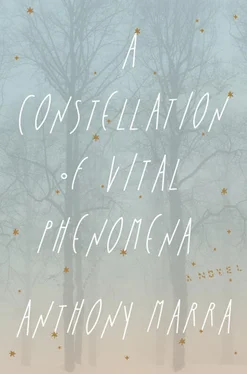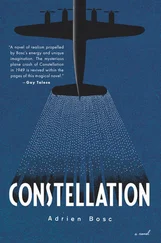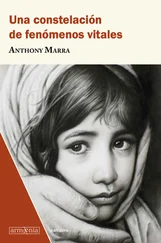The living room had been violently shaken. A fallen bookcase leaned against the divan. On the floor were twelve kopek-sized circles connected by slender shafts of light to twelve bullet holes in the ceiling. She called his name, but the house wouldn’t respond with even an echo. A trail of glass led to the kitchen where the kettle and two cans of evaporated milk were the only intact containers. In the bedroom, a body rested beneath the sheets. A hypodermic needle lay on the floor beside the bed. Akhmed’s wife, Sonja realized. She slowly peeled back the sheet. Out of habit, she felt for a pulse. The woman’s hair smelled of pears. Her hands were smooth, uncalloused, beautiful. Pressing her fingertips to the woman’s forehead, she found herself for the first time in many years standing before a corpse without guilt, a mourner rather than a failed surgeon.
She didn’t know the woman’s favorite color, or her favorite food, or whether she had, as a child, preferred her father’s company to that of her mother; she didn’t know the sound of the woman’s voice, whether it was as small as her body suggested, or much larger, growing as her flesh shrank. She didn’t even know the woman’s name. But she knew this woman had a husband, and he had been a decent man, yes, had been . Akhmed died the moment she saw his wife in bed. He wouldn’t return. Whoever came upon this house next would find fallout, chaos, and would not see the way Akhmed had lived; a stranger, a refugee, would discover this place and never the man and woman it had belonged to.
She found a broom and dustpan in the kitchen closet and swept up the broken dishes and jars and teacups. She righted the living room bookcases and, unsure of how Akhmed had ordered the books, she arranged them alphabetically. She wiped up the plaster shaken loose by gunfire and nailed a wooden board over the bullet holes. She scrubbed the black grime from the basin with steel wool. For more than two hours she tidied the house. The rooms contained so little they were quickly restored, and by early afternoon she had no choice but to face the bedroom. Dust blanketed the bureau, carpeted the floor, filled the frame of their wedding photograph. She pulled a fistful of white athletic socks from the drawer. “Do you mind if I borrow these?” she asked, and took the silence as permission. She cleaned the bureau, floor, windowsill and panes. The edge of the bed, rim of the lamp, and the books stacked beside the nightstand. Hadji Murád was among them and she set it aside knowing this once she’d break her long-standing policy against sad endings. In one of the bureau drawers she found several dozen charcoal-drawn portraits of the woman now lying dead in the bed. In the drawings her cheeks were fuller, her eyes open and clear. In every one she smiled.
When she finished dusting, she turned her attention to the bed. “Several hours after death the sphincter and bladder muscles relax,” she said softly. “It isn’t right to spend an eternity in soiled underwear. I’ll clean you, okay?” She pulled back the covers and stripped off the nightdress. Wearing the socks like gloves she washed the woman’s thighs and buttocks, and then dressed her in a tan skirt, a garden-hose-green sweater, and a burgundy headscarf. She looked like a bouquet of roses. Akhmed had told her that his wife hadn’t walked in more than two years, so after pulling on the last pair of clean socks, she wedged the woman’s feet into a pair of sneakers. “Now you can walk wherever you want.”
After cleaning and dressing the woman, she returned to the manila envelope and collection of pages she’d found hidden beneath her body. The manila envelope was addressed: For K, 56 Eldár Forest Service Road . This K, whoever he was, lived only a handful of houses away. She set it aside and picked up the fastened pages. They appeared to form a letter or journal entry. The first sentence read: This is about your father . She flipped to the last page to read the last sentence, as was her custom, then moved up to the last paragraph, and then the last page:
There is little ink left in the pen, even less energy in my hand, and the time has come. This story ends where you begin. You were born in a hospital. I drove your mother and father in the truck I purchased my son for his sixteenth birthday. Your mother’s face was as red as the paint. Your father kept telling me to drive faster. The maternity ward was on the fourth floor of the hospital. Your father and I helped your mother climb the stairs. When her feet failed, we carried her. She was worried her hips would crush you. Even before you were born, she worried for you. It was amazing to see her love you before you even met. Perhaps our deepest love is already inscribed within us, so its object doesn’t create a new word but instead allows us to read the one written. For their entire lives, even before they met, your mother and father held their love for you inside their hearts like an acorn holds an oak tree. You were their rain and sun, their morning and night .
In the maternity ward the nurse put your mother in a bed and I held her left hand and your father held her right. Custom says that a man shouldn’t be present at a birth, but we didn’t listen, we were there. On the boarded windows were drawings of a city that no longer existed. You were born within the memory of a kinder past. Your mother’s screams opened her jaw so wide you could have come from her mouth. Never have I seen your father so afraid. Then, you arrived. We were all there, waiting for you. The nurse held you in her hands. You didn’t breathe. We held our breaths waiting for you to find yours. And when your mouth opened, and your lungs burst, we knew they would never be empty. And your father, I have never seen a man more joyful .
The nurse who delivered you was named Natasha. All these years later I remember her name because she had remembered mine. She had read my book , Origins of Chechen Civilization, one of the four score who ever had. Hers were the first hands to hold you. When you were suffocating, she taught you to breathe .
Your mother’s were the second hands. She looked at you as if she had been born to you. She passed you to your father. The corners of his eyes crinkled. His heart had been the acorn. Now it was the oak tree .
Those are the first three pairs of hands that held you. How I hope you will live long enough that I will never know the final three .
“What is her name?” the nurse asked, as your father held you to his chest .
“Havaa.” He spoke your name like the rhythm of a pulse .
When they took him, he held your name right there in his chest, and you were with him, even if you didn’t know it. When he reached the end, he did not die. He called your name and began to live in you .
She set down the letter. If her pounding heart spoke a name, it was one she didn’t recognize. Her sister had delivered hundreds of newborns in the seven years she had worked in the maternity ward, hundreds of Havaas, and they were her patients, not her children, neither more nor less loved than the other lives begun and ended, saved and lost, revived and mourned within the gray granite walls of Hospital No. 6. But Sonja couldn’t name those countless others, had not shared with them a mattress or a room or an energy bar, would not recognize their faces on the street or in the bazaar or at the cemetery, did not wish for them what she wished for Havaa, a need, newly made, to save this one life her sister had brought into the world.
Before leaving she surveyed the rooms a final time. Akhmed’s wife lay peacefully, her hands at her sides, her bright white tennis shoes ready to take her anywhere. Sonja propped the front door as best she could and wondered who would enter next. The vacant house would become a haven for refugees who had heard of a hostel in the 30-block of Eldár Forest Service Road. It would never again be as clean as it was the afternoon Sonja left, as one might expect, as some three thousand souls were yet to shelter there.
Читать дальше











